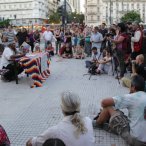English · Español

15 de abril de 2015 | Entrevistas | Acaparamiento de tierras | Anti-neoliberalismo | Bosques y biodiversidad | Derechos humanos | Luchadores sociales en riesgo
Argentina: indigenous people mobilize to defend their territories and other rights
Representatives of 27 indigenous qom, pilagá, wichí and nivaclé communities who live in Formosa Province, Argentina, have been camping since February 14 in Buenos Aires downtown to demand once again the respect of their rights and lands.
Almost five years ago, the indigenous people carried out the same protest in the same place, and all they received as a response was silence or promises that were never fulfilled. Our colleagues at Friends of the Earth Argentina, who collaborate with Real World Radio from their country, interviewed several members of the "QOPIWINI" campsite to know more about their claims.
Cirilo is from Mala’lapel, a community with 400 inhabitants, and he told our collaborators that the main reason why they are holding this protest is the struggle for land, that they are losing every day. "Formosa´s government has allowed multimillion-dollar companies to be installed in these rural areas and forests that belong to us, because our ancestors have lived there for many years. So we are demanding them back. We want a healthy territory, because companies do not only buy, they also pollute".
According to Friends of the Earth Argentina, these large companies clear the lands and burn them to grow soy, which also implies the use of several agrotoxics. A large part of the population of the area drinks the water from the surrounding creeks, which is many times polluted by the use of poisons. "We continue drinking this water that we know causes many diseases, but we don´t have a choice". Cirilo also said that in addition to soy, the lands are used to raise cattle. "We are not against cattle farming, the thing is that they continue selling our lands (...) and are slowly making the forest disappear". The indigenous leader regretted that the future generations will continue suffering the consequences of corporate actions and this production model.
Cirilo said that more and more indigenous people are joining the protest and those camping in the capital city from the beginning are those directly affected "This demand covers everyone, because we are part of the land of Argentina (...) Multimillion dollar companies are not from this country; they pollute, they occupy the land two or three times, and then they leave. And we are left here".
On March 17, the demonstrators submitted a demand to the Executive, Legislative and Judicial branches, but they haven´t received any answer. Nestor, from Riacho de Oro, a community with 89 families, said that they are still waiting for some kind of reaction.
They decided to go to Buenos Aires to see how the national government can react to this, "because we´ve sent many letters to Formosa authorities, but it is as if they don´t listen to our claims". According to Nestor, "the central issue of the discussion is the land, then, when this is solved, we need to focus on work, health, education. Until we don´t have lands, we can´t speak of rights. (...) What we want is to participate and have rights as all human beings".
According to Friends of the Earth Argentina, the attacks against native peoples are constant and the situation has worsened when the illegal espionage practices the community leaders were subject to were made public some time ago.
Jorge, a whichí leader, made reference to some cases of indigenous people who demonstrated and were attacked by the provincial government, even women and children. "There is no way to start a dialogue (...), it is as if we are not part of democracy, we can´t speak (...)". "If we take a look at the Constitution, there are international conventions and agreements that protect our rights. The big question is why these are not complied with".
About the existence of multiple laws that are not respected, Jorge said "at this point, after many centuries, we are exhausted". "We are very patient, but this patience is coming to an end", he added.
Meanwhile, Hector, member of La Primavera Qom community, said that they camped in 2010 demanding the return of their lands, but they still haven´t received an answer. "We can´t live without the forest. (...) It is our supermarket". And he added that the forest is essential to ensure their food and medicines and to build their houses and crafts that can be used as economic sustenance.
The list of disadvantages faced by the indigenous communities of Formosa is long. Among them, they highlighted poor medical attention, lack of drinking water, housing, education. "We want equality", said Hector. "We have to bear with this here and we want to bring good news to our families. It is painful to leave them".
Imagen: Friends of the Earth Argentina








